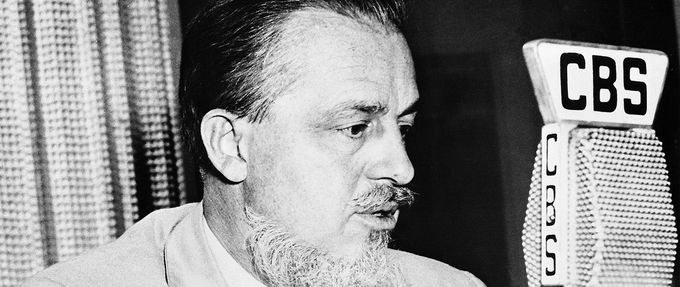Happy Birthday, Rex Stout!
He became famous for creating Nero Wolfe—a character memorably described by an author at The Thrilling Detective Website as a “{m}assively overweight, a cranky, agoraphobic and sedentary gourmet who virtually never leaves his Manhattan brownstone.” But Rex Todhunter Stout—born in Noblesville, Indiana on this date in 1886—wouldn’t introduce fans to the corpulent sleuth until he was in his late forties. Stout had enjoyed a taste of literary success in the early teens before giving up writing for one reason: he wanted to be a success in business before picking up a writing instrument again. Rex succeeded in this goal…sort of. By the time he resumed writing fiction it was of financial necessity since much of his fortune was wiped out in the Wall Street crash of 1929.
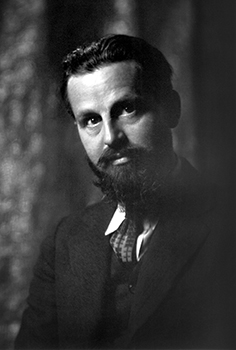 Rex Stout may have been a Hoosier by birth, but his family soon moved to Kansas. They were a Quaker clan consisting of father John Wallace, mother Lucretia Elizabeth (Todhunter), and eight siblings. John Wallace was a schoolteacher by trade and encouraged young Rex to read; Stout had devoured the Bible twice by the time he was four. Rex would also become the state spelling bee champion at age 13, later attending Topeka High School and then (briefly) the University of Kansas at Lawrence. Stout joined the Navy for a two-year hitch between 1906 and 1908 (he served as a yeoman on President Theodore Roosevelt’s president yacht) and then embarked on a “jack-of-all-trades” career. Over the next four years, he moved through six different states, working as a bookkeeper, a salesman, a hotel manager, and a cigar store clerk.
Rex Stout may have been a Hoosier by birth, but his family soon moved to Kansas. They were a Quaker clan consisting of father John Wallace, mother Lucretia Elizabeth (Todhunter), and eight siblings. John Wallace was a schoolteacher by trade and encouraged young Rex to read; Stout had devoured the Bible twice by the time he was four. Rex would also become the state spelling bee champion at age 13, later attending Topeka High School and then (briefly) the University of Kansas at Lawrence. Stout joined the Navy for a two-year hitch between 1906 and 1908 (he served as a yeoman on President Theodore Roosevelt’s president yacht) and then embarked on a “jack-of-all-trades” career. Over the next four years, he moved through six different states, working as a bookkeeper, a salesman, a hotel manager, and a cigar store clerk.
Rex Stout’s career as an author began in 1910 with the sale of three poems to the magazine The Smart Set. Between 1912 and 1918 he contributed close to 40 fictional works to such publications as All-Story Magazine, Smith’s Magazine, and Lippincott’s Monthly Magazine. His early efforts included detective fiction, but Stout was also adept at stories of romance, adventure, and science fiction/fantasy. Rex disliked of having to write stories for cash, so in 1916 (with one of his brothers) he invented a school banking system (it kept track of the money that children saved in school accounts). This venture paid off handsomely and allowed him to travel extensively in Europe. Stout wouldn’t return to writing again until the late 1920s. He published his first book How Like a God with the Vanguard Press—a company he had helped to found, which published books of a left-wing nature…and those books deemed “unpublishable” elsewhere.
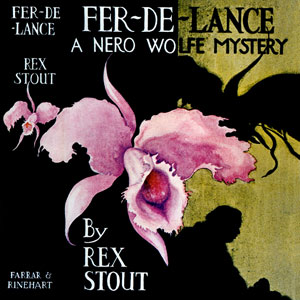 Following the success of the 1934 political thriller The President Vanishes (which later became a Paramount motion picture starring future Mr. President Edward Arnold), Rex Stout introduced his most famous literary creation in Fer-de-Lance (1934): Nero Wolfe. Nero was the yardstick by which “armchair detective” is measured (one critic dubbed him “that Falstaff of detectives”). He had an assistant, Archie Goodwin, do most of the legwork as Nero tooled around his Manhattan brownstone tending to his orchids and satisfying his epicurean cravings for fine beer and food. Fer-de-Lance provided a shot in the arm to what was then the fledgling detective fiction genre, and Stout followed that work with over 70 novels/novellas released between 1934 and 1975. (Death Times Three, which features a novella and two short stories written by Stout, was published posthumously in 1985!)
Following the success of the 1934 political thriller The President Vanishes (which later became a Paramount motion picture starring future Mr. President Edward Arnold), Rex Stout introduced his most famous literary creation in Fer-de-Lance (1934): Nero Wolfe. Nero was the yardstick by which “armchair detective” is measured (one critic dubbed him “that Falstaff of detectives”). He had an assistant, Archie Goodwin, do most of the legwork as Nero tooled around his Manhattan brownstone tending to his orchids and satisfying his epicurean cravings for fine beer and food. Fer-de-Lance provided a shot in the arm to what was then the fledgling detective fiction genre, and Stout followed that work with over 70 novels/novellas released between 1934 and 1975. (Death Times Three, which features a novella and two short stories written by Stout, was published posthumously in 1985!)
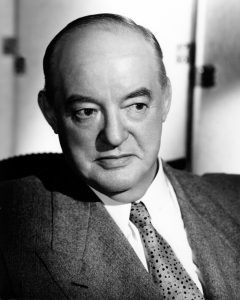 It would be no exaggeration to state that Rex Stout’s Nero Wolfe made an enormous contribution to pop culture. Fer-de-Lance was adapted by Columbia Pictures for the silver screen in 1936 as Meet Nero Wolfe (with President Vanishes star Edward Arnold as Nero). Then, the studio followed that the following year with a silver screen take of Stout’s second Wolfe outing, The League of Frightened Men (with Walter Connolly as the detective). Rex didn’t care for the way that these movies interpreted his sleuth (in Frightened Men, Nero craves hot chocolate instead of the beer he lovingly quaffed in the novels). However, he did allow the radio networks to introduce Wolfe to the airwaves beginning in 1943 with a small regional network’s The Adventures of Nero Wolfe. This version eventually moved to NBC and, in its one-year run, featured actors Santos Ortega and Luis van Rooten as the detective.
It would be no exaggeration to state that Rex Stout’s Nero Wolfe made an enormous contribution to pop culture. Fer-de-Lance was adapted by Columbia Pictures for the silver screen in 1936 as Meet Nero Wolfe (with President Vanishes star Edward Arnold as Nero). Then, the studio followed that the following year with a silver screen take of Stout’s second Wolfe outing, The League of Frightened Men (with Walter Connolly as the detective). Rex didn’t care for the way that these movies interpreted his sleuth (in Frightened Men, Nero craves hot chocolate instead of the beer he lovingly quaffed in the novels). However, he did allow the radio networks to introduce Wolfe to the airwaves beginning in 1943 with a small regional network’s The Adventures of Nero Wolfe. This version eventually moved to NBC and, in its one-year run, featured actors Santos Ortega and Luis van Rooten as the detective.
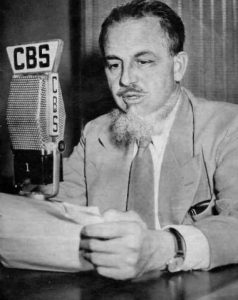 The Amazing Nero Wolfe surfaced on Mutual on Sunday nights in the summer of 1946 with Francis X. Bushman portraying Nero…but the program’s run was a brief one, leaving the airwaves in December. The most well-known radio incarnation of Rex Stout’s sleuth would premiere with The New Adventures of Nero Wolfe on October 20, 1950 for NBC, with filmdom’s Sydney Greenstreet as Nero. Stout thought Greenstreet was perfect casting, though he didn’t care for the series’ scripts. However, the New Nero had difficulty locating a sponsor and beat a hasty retreat back to the detective’s brownstone on April 27, 1951. One could speculate as to why Rex was so enthusiastic about seeing Nero Wolfe become a radio success. The author himself was no stranger to the aural medium. He appeared several times on the intellectual quiz show Information Please (Rex also appeared as the “guest panelist” in the first theatrical Please short released in 1939), not to mention the likes of the wartime series Our Secret Weapon, This is Our Enemy, and Wake Up America. Other Stout radio appearances include The Author Meets the Critics, Invitation to Learning, The People’s Platform, Speaking of Books, Speaking of Liberty, and The Voice of Freedom.
The Amazing Nero Wolfe surfaced on Mutual on Sunday nights in the summer of 1946 with Francis X. Bushman portraying Nero…but the program’s run was a brief one, leaving the airwaves in December. The most well-known radio incarnation of Rex Stout’s sleuth would premiere with The New Adventures of Nero Wolfe on October 20, 1950 for NBC, with filmdom’s Sydney Greenstreet as Nero. Stout thought Greenstreet was perfect casting, though he didn’t care for the series’ scripts. However, the New Nero had difficulty locating a sponsor and beat a hasty retreat back to the detective’s brownstone on April 27, 1951. One could speculate as to why Rex was so enthusiastic about seeing Nero Wolfe become a radio success. The author himself was no stranger to the aural medium. He appeared several times on the intellectual quiz show Information Please (Rex also appeared as the “guest panelist” in the first theatrical Please short released in 1939), not to mention the likes of the wartime series Our Secret Weapon, This is Our Enemy, and Wake Up America. Other Stout radio appearances include The Author Meets the Critics, Invitation to Learning, The People’s Platform, Speaking of Books, Speaking of Liberty, and The Voice of Freedom.
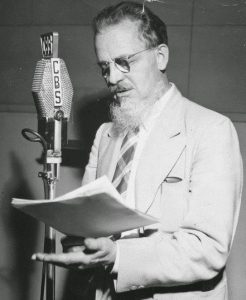 If the shows noted above sound a little “high-toned,” it’s because Rex Stout took special pains to cultivate an image as a public intellectual—he once described himself in 1942 as “pro-Labor, pro-New Deal, pro-Roosevelt left liberal.” Stout proudly associated himself with the American Civil Liberties Union and was one of the founders of The New Masses, a radical Marxist magazine. As a member of organizations like Friends of Democracy, the Writers’ War Board, and the United World Federalists, you might wonder how Rex escaped the notice of the House Un-American Activities Committee. Well, he didn’t. Chairman Martin Dies accused Stout of being a Communist, prompting the author to reply: “I hate Communists as much as you do, Martin, but there’s one difference between us. I know what a Communist is and you don’t.” Stout made no bones about his anti-Communism (he later became a hawkish supporter of the Vietnam War), but he was still monitored by J. Edgar Hoover’s FBI, particularly when he served as head of the Authors League of America.
If the shows noted above sound a little “high-toned,” it’s because Rex Stout took special pains to cultivate an image as a public intellectual—he once described himself in 1942 as “pro-Labor, pro-New Deal, pro-Roosevelt left liberal.” Stout proudly associated himself with the American Civil Liberties Union and was one of the founders of The New Masses, a radical Marxist magazine. As a member of organizations like Friends of Democracy, the Writers’ War Board, and the United World Federalists, you might wonder how Rex escaped the notice of the House Un-American Activities Committee. Well, he didn’t. Chairman Martin Dies accused Stout of being a Communist, prompting the author to reply: “I hate Communists as much as you do, Martin, but there’s one difference between us. I know what a Communist is and you don’t.” Stout made no bones about his anti-Communism (he later became a hawkish supporter of the Vietnam War), but he was still monitored by J. Edgar Hoover’s FBI, particularly when he served as head of the Authors League of America.
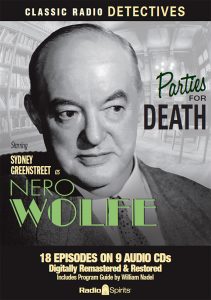 Rex Stout became president of the Mystery Writers of America in 1958, and the following year received that organization’s prestigious Grand Master Award. His output of Nero Wolfe novels didn’t start to slow until the mid-sixties…but he still managed to complete four novels between 1968 (The Father Hunt) and 1975 (A Family Affair). Stout left this world for a better one in October of 1975 at the age of 88.
Rex Stout became president of the Mystery Writers of America in 1958, and the following year received that organization’s prestigious Grand Master Award. His output of Nero Wolfe novels didn’t start to slow until the mid-sixties…but he still managed to complete four novels between 1968 (The Father Hunt) and 1975 (A Family Affair). Stout left this world for a better one in October of 1975 at the age of 88.
“If he had done nothing more than to create Archie Goodwin, Rex Stout would deserve the gratitude of whatever assessors watch over the prosperity of American literature,” wrote Jacques Barzun for a birthday tribute to Rex Stout in 1965. “For surely Archie is one of the folk heroes in which the modern American temper can see itself transfigured.” To honor today’s birthday celebrant, Radio Spirits invites you to check out both of our collections featuring The New Adventures of Nero Wolfe broadcasts: The Case of the Midnight Ride and Other Tales and Parties for Death. You’ll also find a TV pilot (from 1959) for a possible Nero series on the DVD collection Television’s Lost Classics: Volume 2 – Rare Pilots. (And in a bit of shameless self-promotion, you’ll find a review of this set at my home base of Thrilling Days of Yesteryear.) Happy birthday, Rex!

